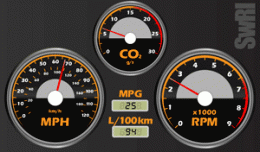SwRI demonstrates traffic management to minimize environmental impacts

Southwest Research Institute (SwRI) is collecting and communicating real-time vehicle emissions data to demonstrate new concepts in environment-based traffic management as part of a connected vehicle test bed at the 18th World Congress on Intelligent Transport Systems in Orlando, Oct.16-20.
The SwRI Environmental Management System uses connected vehicle technology, specifically vehicle-to-infrastructure communications, to send emissions data from a demonstration vehicle to a central Advanced Traffic Management System. Using the vehicle emissions data, traffic management center operators can identify environmental "hot spots" along the roadway and use congestion management techniques to reduce the environmental impact of traffic.
"The Institute is uniquely positioned to combine expertise with vehicle emissions, intelligent vehicles, connected vehicles and ATMS technologies," said Josh Johnson, manager of Transportation Systems at SwRI. "Using this expertise, SwRI wirelessly sends real-time emissions data directly from a vehicle to a central system, delivering anonymous data packets to an ATMS, which aggregates the information, allowing operators to manage traffic in relationship to the environment."
The demonstration vehicle also displays instantaneous emissions data to the driver, providing feedback as to how driver behaviors, such as acceleration-braking cycles, affect the environment.
"Vehicles have provided drivers with average fuel efficiency information for a number of years," said Johnson. "We're presenting this information in terms of direct environmental impact, displaying levels of CO2 emissions to encourage 'green' driving."
"The hope is that our advanced traffic management systems can not only improve roadway safety and efficiency, but also decrease the environmental impact of traffic as well," Johnson continued. "To take this innovation from demonstration to real-world implementation, we would need to develop best practices and automation tools for using the gathered environmental data to manage traffic."
The Connected Vehicle Technology Showcase is unique to the ITS World Congress, demonstrating new technology solutions to address major transportation challenges that impact the traveling public and the economy. Vehicle-to-infrastructure demonstrations will use a network of roadside devices installed along key corridors in the Orlando area to provide an interface between vehicles and a showcase version of Florida's statewide SunGuide® ATMS. SwRI is a key player in the development and continuing improvement of SunGuide, which provides real-time traffic data, travel advisories and information to Florida's drivers.
Provided by Southwest Research Institute


















